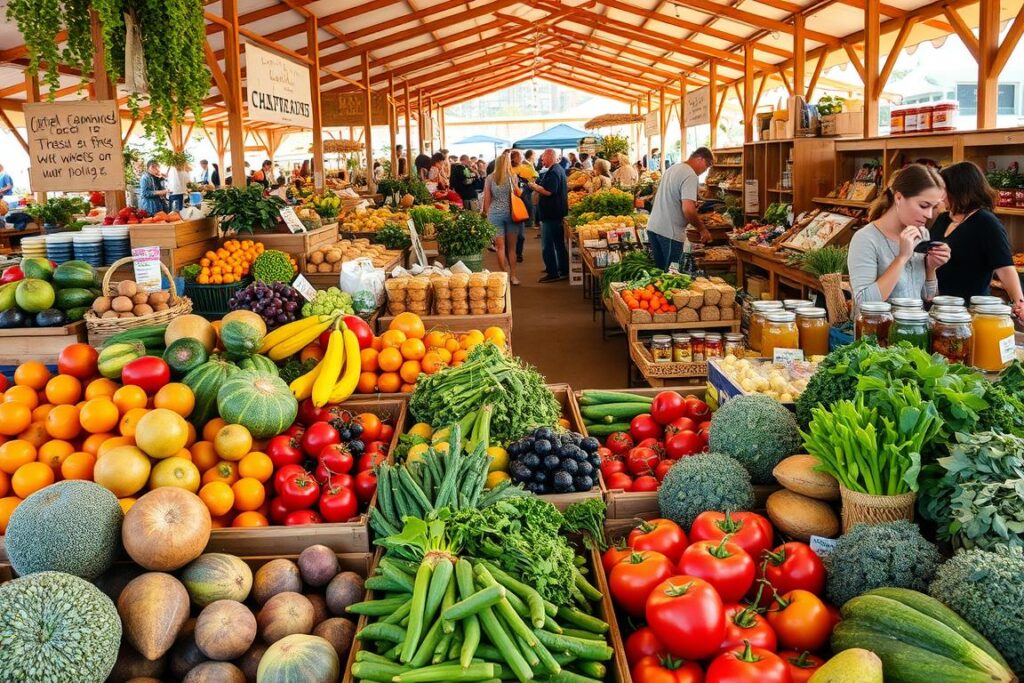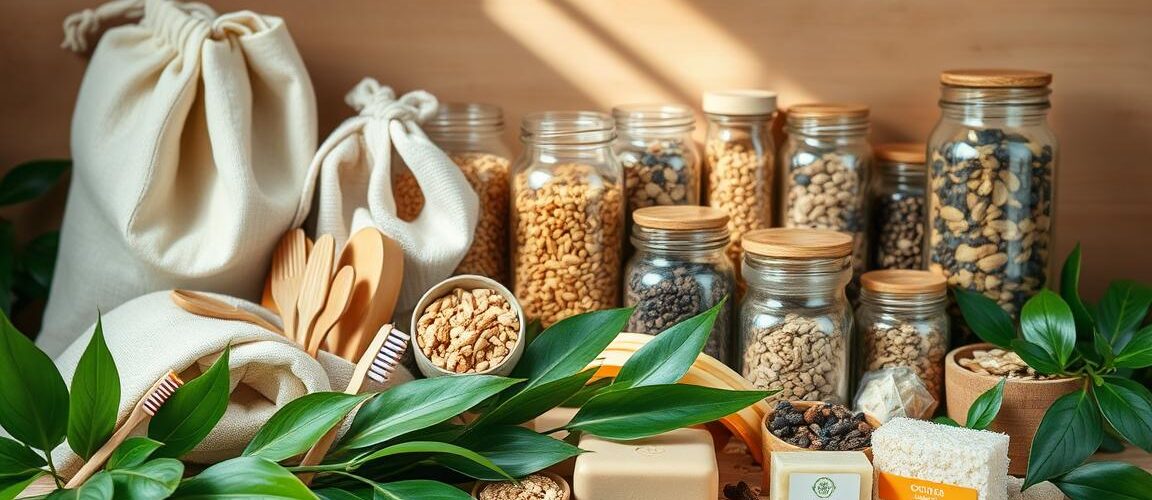Are the foods we eat and the natural products we use truly making us healthier?
Many of us are now choosing eco-friendly products to stay away from harmful chemicals. The Mayo Clinic says organic foods might have less pesticide and more antioxidants than regular foods.
By picking natural products, we help farming that’s good for the planet. This makes our homes and families healthier.
Key Takeaways
- Organic foods may have lower pesticide residue levels.
- Choosing natural products supports sustainable farming.
- Eco-friendly products can reduce exposure to harmful chemicals.
- Organic foods may have higher antioxidant levels.
- A healthier lifestyle can be achieved through conscious product choices.
What Are Organic Products?
The term ‘organic’ is often linked to healthier eating. But what are organic products? They are made without most synthetic materials like pesticides and fertilizers. The U.S. Department of Agriculture says crops must not use these substances for three years before they can be called organic.
Understanding Organic Farming is key to seeing the value of organic products. Organic farming focuses on soil health, biodiversity, and water use. It makes products healthier for us and better for the planet. Organic farming uses methods like crop rotation and composting to improve the ecosystem.
Understanding Organic Farming
Organic farming avoids synthetic fertilizers and pesticides. It uses natural methods to keep the environment balanced and preserve biodiversity. This approach makes products safer for us and better for the planet.
| Farming Practice | Organic | Conventional |
|---|---|---|
| Pest Control | Biological pest control, crop rotation | Synthetic pesticides |
| Fertilizers | Compost, green manure | Synthetic fertilizers |
| Soil Health | Crop rotation, cover crops | Monoculture, intensive tillage |
Key Certifications to Look For
When buying organic products, look for key certifications. The USDA Organic seal is well-known in the U.S. It means the product is mostly organic and free from banned substances.
Other certifications like Non-GMO and Certified Humane are also important. Knowing these can help you choose products that fit your values.
Benefits of Choosing Organic Products
Choosing organic products boosts our health and helps the planet. Organic foods and skincare have many benefits. They are a top choice for many.
Health Perks of Organic Foods
Organic foods have more antioxidants and less pesticide residue than non-organic ones. Eating them might lower the risk of diseases like cancer and heart disease. This improves our overall health.
Organic foods are best for kids and pregnant women. They avoid harmful chemicals. Plus, they’re fresher and taste better, perfect for families.
Environmental Advantages
Organic farming is good for the environment. It uses no synthetic fertilizers or pesticides. This saves water, prevents soil erosion, and keeps soil healthy.
Organic farming also cuts down on carbon emissions. Choosing organic supports green products and chemical-free products. It’s a simple way to help the planet.
- Less environmental pollution
- More biodiversity
- Supports sustainable farming
By picking organic, like organic skincare, we help our health and the planet. Organic products are a smart choice for those wanting to make a difference.
Popular Types of Organic Products
Exploring organic products reveals a wide range of choices. The market for these products has grown a lot. This gives consumers many options.
Organic products fall into several categories, each with its own benefits. Let’s look at some of the most popular ones.
Organic Fruits and Vegetables
Organic fruits and veggies are grown without harmful chemicals. The Environmental Working Group says some fruits and veggies have more pesticide residue than others. Choosing organic can lower your exposure to these chemicals.
Benefits of Organic Fruits and Vegetables:
- Lower pesticide residue
- Higher antioxidant levels
- Better taste and nutrition

Organic Dairy and Meat Products
Organic dairy and meat come from animals not given antibiotics or hormones. This helps animals and keeps humans safe from antibiotic resistance.
Key advantages of organic dairy and meat products include:
- Improved animal welfare
- Lower risk of antibiotic resistance
- Better fatty acid profile
Organic Grains and Snacks
Organic grains and snacks are made from ingredients without synthetic chemicals. They are healthier and support sustainable farming.
Benefits of choosing organic grains and snacks:
- Reduced exposure to pesticides
- Support for sustainable farming practices
- Often higher in fiber and nutrients
How to Identify Quality Organic Products
When you’re shopping for organic products, it’s important to know what to look for. This ensures you get sustainable goods of high quality. By making smart choices, we can help drive demand for true organic products.
To make good choices, we need to know what quality looks like in organic products. This means reading labels well and knowing the different certification symbols. These symbols show if a product meets organic standards.
Reading Labels Effectively
First, you need to read labels to spot quality organic products. The label should clearly say the product is organic. Look for the USDA Organic seal to know it meets strict organic standards.
Labels might also show other certifications like Non-GMO or Fair Trade. These symbols mean the product supports values like transparency and fair labor. Knowing about these certifications helps you choose products that match your values.
| Certification | Description | Benefits |
|---|---|---|
| USDA Organic | Ensures products meet strict organic production standards. | Promotes organic farming practices, biodiversity, and environmental sustainability. |
| Non-GMO | Indicates the product does not contain genetically modified organisms. | Provides transparency regarding the absence of GMOs in the product. |
| Fair Trade | Promotes fair trade practices and equitable compensation for producers. | Supports social responsibility and fair labor practices. |
Understanding Certification Symbols
Certification symbols are key to finding quality organic products. The USDA Organic seal is well-known. It means the product has at least 95% organic ingredients. For more on using organic products in your diet, check out Dietary Strategies for Controlling Type 2.
By learning to read labels and recognizing symbols, we can pick green products confidently. These choices support our values and help create a sustainable future.
The Cost of Organic Products: Are They Worth It?
Thinking about switching to organic products raises a big question: the cost. Organic products are often seen as pricier than non-organic ones. But, it’s important to think about the benefits they offer over time.
Price Comparison with Conventional Products
Looking at prices, organic products tend to be more expensive. For example, a study showed organic fruits and veggies can be up to 47% pricier.
| Product | Conventional Price ($) | Organic Price ($) |
|---|---|---|
| Apples (per pound) | 1.50 | 2.50 |
| Carrots (per bunch) | 0.80 | 1.20 |
| Chicken Breast (per pound) | 3.50 | 5.00 |
Long-Term Health Savings
The upfront cost of organic products might seem steep. But, the health benefits can save you money in the long run. The Mayo Clinic says choosing organic can lower disease risk, saving on healthcare costs.
By avoiding pesticides and harmful chemicals, we might avoid chronic diseases. This could mean long-term health savings, cutting down on medical bills and lost work time.
Where to Buy Organic Products
Shopping for organic products is now easier than ever. We have many places to buy organic items. From local farmers’ markets to online stores, there are plenty of options.
Local Farmers’ Markets
Local farmers’ markets are a top choice for organic products. The USDA says these markets have a lot of organic items. You can find fresh produce, dairy, and meat here. Shopping here helps local farmers and is good for the planet.

Health Food Stores
Health food stores are also a great place to find environmentally friendly products. They have a wide range of organic foods like grains, snacks, and supplements. Here, you can find products that fit your values and dietary needs.
Online Retailers
Online stores make it easy to buy green products from home. Many websites offer a big selection of organic products. They often have detailed descriptions and customer reviews to help you choose.
| Retail Option | Benefits | Product Range |
|---|---|---|
| Local Farmers’ Markets | Support local farmers, fresh products | Fresh produce, dairy, meat |
| Health Food Stores | Wide selection of organic foods | Grains, snacks, supplements |
| Online Retailers | Convenient shopping, customer reviews | Wide range of organic products |
Common Misconceptions About Organic Products
As more people want organic products, it’s important to know what’s true and what’s not. Many think organic products are chemical-free, but it’s not that simple.
Organic farming doesn’t use synthetic fertilizers or pesticides. But, it’s a myth that organic products have no chemicals at all. The Environmental Working Group says some organic products might have pesticide residue, but at lower levels than non-organic ones. This is key for those who choose organic food and organic skincare for health and the planet.
Myths vs. Facts
Let’s clear up some common myths about organic products. One big myth is that organic farming is completely pesticide-free. But, organic farming does use some natural pesticides, even if they come from nature.
- Myth: Organic products are always more nutritious.
- Fact: Organic products might have less pesticide residue, but they’re not always more nutritious.
- Myth: Organic products are not regulated.
- Fact: Organic products must follow strict rules and get certified.
The Truth About Pesticides
It’s key to know how pesticides work in organic farming. Organic farming focuses on soil health and diversity, which means less need for synthetic pesticides and fertilizers. For example, using organic skincare products is good for our skin and the planet.
Choosing organic products helps a farming system that’s better for the environment. It’s about making choices that match our values on health, the environment, and sustainability.
Making the Transition to Organic Products
Switching to organic products is more than just a shopping change. It’s a healthier lifestyle choice. It boosts our well-being and helps the environment. Starting small makes it easy to add organic items to our daily routine.
We can start by swapping a few non-organic items for organic ones. For example, try buying organic fruits and vegetables or switching to organic dairy products. The Mayo Clinic says this can improve our health. It’s a gradual way to adjust our spending and preferences.
Starting Small: Incorporating Organic Foods
Small changes can make a big difference. Start by buying organic versions of your favorite fruits and veggies, like leafy greens or berries.
Meal Planning with Organic Options
Meal planning helps us use green products more. Plan meals with seasonal organic produce to support local farmers. This way, we eat well and reduce waste.
| Product | Conventional | Organic |
|---|---|---|
| Fruits and Vegetables | May contain pesticide residues | Produced without synthetic pesticides |
| Dairy Products | May contain hormones and antibiotics | Produced without added hormones and antibiotics |
| Grains | May be grown using synthetic fertilizers | Grown using natural fertilizers |
Choosing sustainable goods improves our health and supports the planet. Every choice we make matters. Together, we can build a healthier, greener future.
The Future of Organic Products in the Market
As we focus on our health and the planet’s well-being, organic products are becoming more popular. The USDA says this is because people want to be healthy and sustainable. This looks good for the future of organic products.
Growing Consumer Interest
More and more of us are choosing organic and eco-friendly options. This isn’t just a passing trend. It’s a big move towards living healthier.
Innovations in Organic Farming
New ways of farming, like vertical farming and regenerative agriculture, are boosting the organic market. These methods are better for the planet and improve the quality of organic food. This makes organic products more available to everyone.
Looking ahead, organic products will keep being important in our lives. They will help shape the market and lead to a healthier, greener world.



